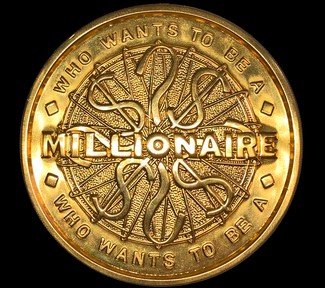Quiz Answer Key and Fun Facts
1. This lifeline could be used in conjunction with the "Double Dip" lifeline to guarantee a correct answer.
2. Unique to India's Hindi-language version of "Millionaire", this lifeline allowed a lifeline to be reused after it had already been used. The second word of this lifeline's name roughly translates to "joker".
3. When COVID and social distancing came around, this lifeline was replaced with an alternate one called "Ask the Host".
4. If a player was really stumped, they could use this lifeline to have the current query thrown out and replaced with an alternate one.
5. This Halloween-themed lifeline allowed a player to see how much money a particular question was worth if its value was hidden.
6. This lifeline allowed a player to bypass a question entirely, but doing so forfeited whatever money that question was worth.
7. Only ever used in a few European countries' versions of the show, this lifeline allows a player to confer with two or three well-known people. (No astrology is involved.)
8. This risky lifeline, when invoked, gave players a 50% chance of answering correctly, but they forfeited the ability to walk away.
9. Only ever seen in some of India's versions of "Millionaire", this lifeline was provided to a contestant's friends if they thought he or she was leaning toward a wrong answer.
10. Created for Disney World's version of the show, this lifeline guarantees a surprise for both the player and the person who's helping out -- and for a correct answer, both parties win a prize.
Source: Author
MrNobody97
This quiz was reviewed by FunTrivia editor
kyleisalive before going online.
Any errors found in FunTrivia content are routinely corrected through our feedback system.
